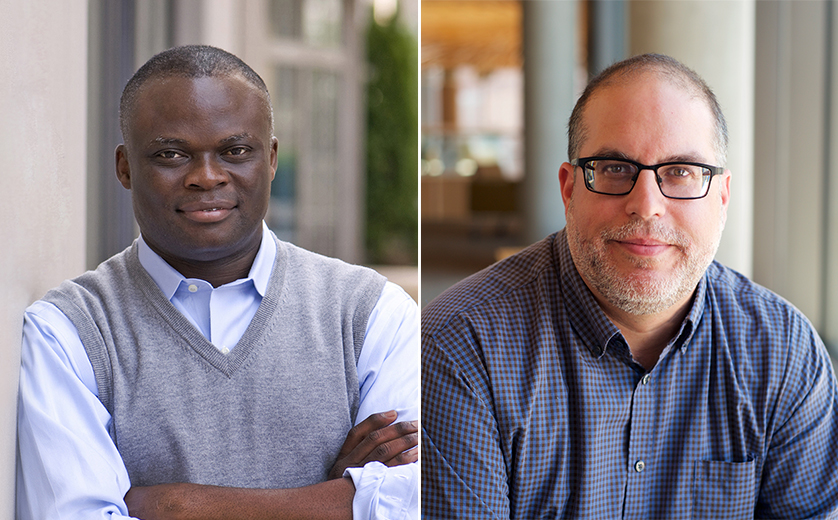This fall, the Brown School welcomes two new faculty members: Professor Fred Ssewamala and Associate Professor Leopoldo J. Cabassa. They both join Washington University in St. Louis from Columbia University and share academic roots at the Brown School, where they earned their master’s and doctorate degrees.
“We are extremely proud to welcome Fred and Leopoldo back to the Brown School,” said Mary M. McKay, Neidorff Family and Centene Corporation Dean of the Brown School. “Their knowledge and experience in finding evidence-based ways to improve people’s lives, health and well-being will be a tremendous benefit to our students, our faculty and our impact across the world.”
Ssewamala: Improving Opportunities for Vulnerable Youth
Ssewamala’s interest in improving outcomes for disadvantaged youth stems from his own childhood in Uganda. After the loss of his parents, he was raised by his extended family and the community. This experience influenced Ssewamala’s decision to focus his academic work on vulnerable children.
“I was one of them,” he said. “If I had not been given opportunity, I would not be where I am.”
For Ssewamala, returning to Brown is more than a new academic opportunity. “This is my second home,” said Ssewamala, who first came to the U.S. to attend the Brown School. “I’m looking forward to being able to contribute to the school.”
Ssewamala’s research aims to improve life chances and long-term development of children and adolescent youth, particularly those impacted by poverty and HIV/AIDS in sub-Saharan Africa. In 2013, he established the International Center for Child Health and Development (ICHAD), which will now be housed at the Brown School. He recently received a $3.4 million National Institutes of Health grant to study the effectiveness of interventions aimed at protecting adolescent girls in Uganda against known HIV risk factors. Other research projects focus on family-based financial savings, ways to improve adherence to antiretroviral medication, and strategies to keep adolescent girls in school.
“These children we work with are bright; they have big dreams. The only things missing in their lives are resources and opportunities,” said Ssewamala. “So how do we help poor communities share in development? I want to figure out what works, and inform practice and policy.”
The biggest misconception, he added, is that poor families in sub-Saharan Africa are too poor to save, and that they want handouts. “What they want is to be connected to inclusion opportunities. All they need is to be given a chance, just like any of us.”
In addition to his research, Ssewamala looks forward to interacting with students in the classroom, and mentoring both master’s and PhD students.
“Teaching gives me a chance to share with the students what I do in the field,” he said. “It’s another avenue of dissemination and helping to build a cadre of new researchers. It also allows me to learn from the students — many of my research questions have come from the classroom.”
Cabassa: Making an Impact at the Intersection of Physical and Mental Health
Cabassa’s journey to improve the lives of people living with health and mental health problems began as he was growing up in Puerto Rico. He witnessed how several of his family members coped and struggled with physical and mental health conditions.
“I saw how care could work — and what happens when it’s not provided,” he said.
This experience led him to focus on the intersection of physical health and mental health, particularly among racial and ethnic minorities with serious mental illness, such as schizophrenia. His interest in inequities in the access, use, and quality of healthcare for minorities was formed during his study at the Brown School.
People with serious mental illness in the U.S. die on average 10 to 20 years earlier than people without, cited Cabassa. Reasons include unhealthy lifestyles, side effects of medication, poverty and a lack of access to high-quality health care. Problematic stereotypes that incorrectly characterize clients with mental illness as dangerous and difficult to work with also contribute to poor health care access for many.
“Mental and physical health are inextricably connected to each another. Social workers can play a major role in integrating care, particularly in communities that have been historically underserved,” he said.
In previous faculty appointments, Cabassa and his team have conducted studies that brought depression care to primary care clinics in Los Angeles, and integrated health care services in a public outpatient mental health clinic in New York City. With a $1.3 million National Institute of Mental Health grant, he is working on a program that trains those who have recovered from serious mental illness to deliver a diet and exercise intervention to overweight people with mental illness who are living in supportive housing.
“To see people who have recovered from mental illness and now are able to contribute to other people’s recovery — that has been a big inspiration,” he said.
Cabassa is also inspired by teaching. “Teaching is the opportunity to be challenged with new ideas,” he said, “and to engage students in connecting the science in the classroom with the realities of the world, so they can improve lives.”
